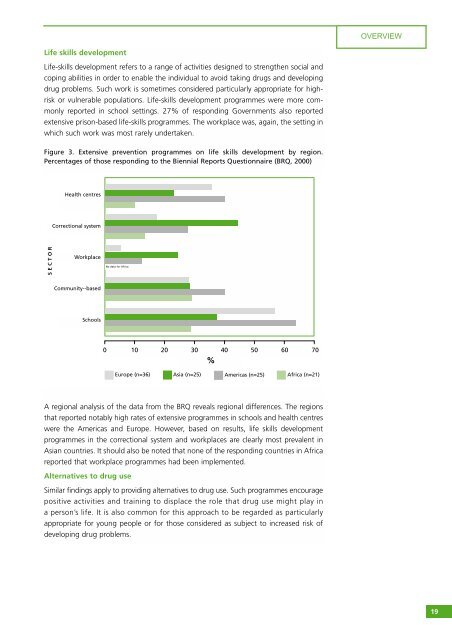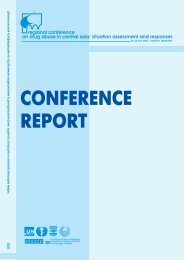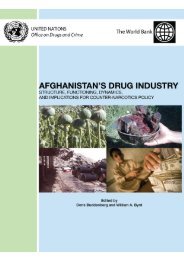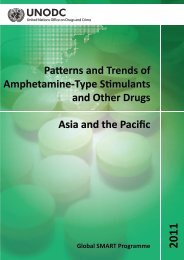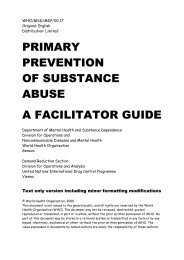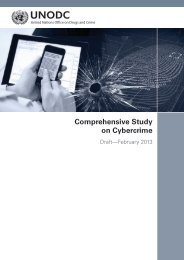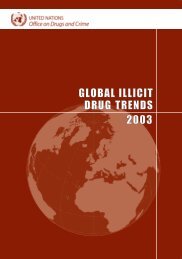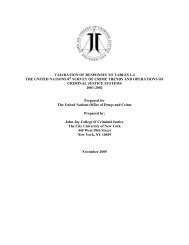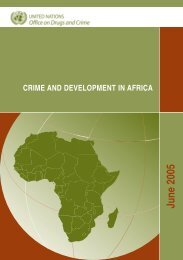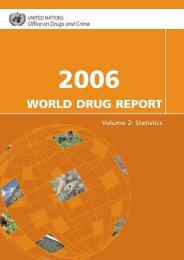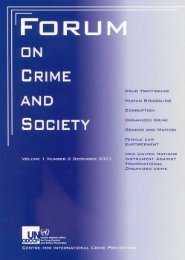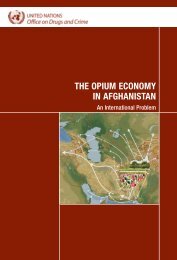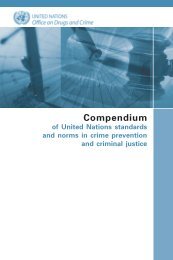PDF (Lessons learned in drug abuse prevention: a global review)
PDF (Lessons learned in drug abuse prevention: a global review)
PDF (Lessons learned in drug abuse prevention: a global review)
You also want an ePaper? Increase the reach of your titles
YUMPU automatically turns print PDFs into web optimized ePapers that Google loves.
OVERVIEW<br />
Life skills development<br />
Life-skills development refers to a range of activities designed to strengthen social and<br />
cop<strong>in</strong>g abilities <strong>in</strong> order to enable the <strong>in</strong>dividual to avoid tak<strong>in</strong>g <strong>drug</strong>s and develop<strong>in</strong>g<br />
<strong>drug</strong> problems. Such work is sometimes considered particularly appropriate for highrisk<br />
or vulnerable populations. Life-skills development programmes were more commonly<br />
reported <strong>in</strong> school sett<strong>in</strong>gs. 27% of respond<strong>in</strong>g Governments also reported<br />
extensive prison-based life-skills programmes. The workplace was, aga<strong>in</strong>, the sett<strong>in</strong>g <strong>in</strong><br />
which such work was most rarely undertaken.<br />
Figure 3. Extensive <strong>prevention</strong> programmes on life skills development by region.<br />
Percentages of those respond<strong>in</strong>g to the Biennial Reports Questionnaire (BRQ, 2000)<br />
Health centres<br />
Correctional system<br />
SECTOR<br />
Workplace<br />
No data for Africa<br />
Community--based<br />
Schools<br />
0 10 20 30 40 50 60 70<br />
%<br />
Europe (n=36) Asia (n=25) Americas (n=25) Africa (n=21)<br />
A regional analysis of the data from the BRQ reveals regional differences. The regions<br />
that reported notably high rates of extensive programmes <strong>in</strong> schools and health centres<br />
were the Americas and Europe. However, based on results, life skills development<br />
programmes <strong>in</strong> the correctional system and workplaces are clearly most prevalent <strong>in</strong><br />
Asian countries. It should also be noted that none of the respond<strong>in</strong>g countries <strong>in</strong> Africa<br />
reported that workplace programmes had been implemented.<br />
Alternatives to <strong>drug</strong> use<br />
Similar f<strong>in</strong>d<strong>in</strong>gs apply to provid<strong>in</strong>g alternatives to <strong>drug</strong> use. Such programmes encourage<br />
positive activities and tra<strong>in</strong><strong>in</strong>g to displace the role that <strong>drug</strong> use might play <strong>in</strong><br />
a person’s life. It is also common for this approach to be regarded as particularly<br />
appropriate for young people or for those considered as subject to <strong>in</strong>creased risk of<br />
develop<strong>in</strong>g <strong>drug</strong> problems.<br />
19


